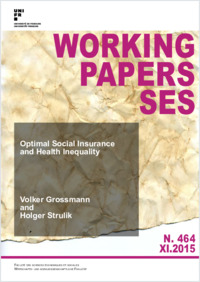Optimal social insurance and health inequality
BP2-STS
-
20.11.2015
47
English
This paper integrates into public economics a biologically founded, stochastic process of individual ageing. The novel approach enables us to investigate the interaction between health and retirement policy in order to quantitatively characterize the optimal joint design of the social insurance system today and in response to future medical progress, and its implications for health inequality. Calibrating our model to Germany, we find that currently the public health and pension system is approximately optimal. Future progress in medical technology calls for a potentially drastic increase in health spending that typically shall be accompanied with a lower pension savings rate and a higher retirement age. Medical progress and higher health spending is predicted to lead to more health inequality.
- Collections
- Faculty
- Faculté des sciences économiques et sociales et du management
- Language
-
- English
- Classification
- Economics
- Series statement
-
- Working Papers SES ; 464
- License
-
License undefined
- Identifiers
-
- RERO DOC 257627
- RERO R008306872
- Persistent URL
- https://folia.unifr.ch/unifr/documents/304492
Statistics
Document views: 136
File downloads:
- Document: 302
